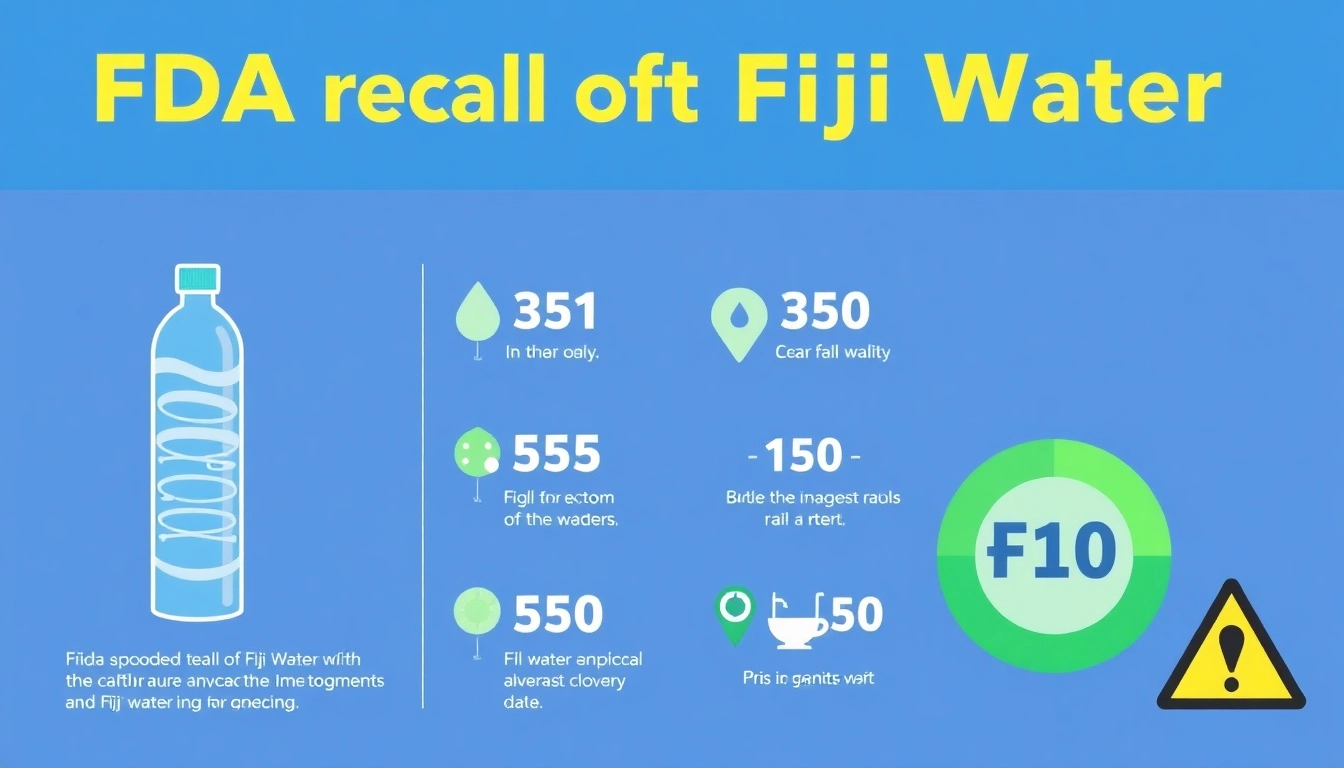Overview of the FDA Recall on Fiji Water
In recent months, consumers and retailers alike have been alerted to significant health concerns surrounding Fiji Water, leading to an FDA recall of nearly 1.9 million bottles of Fiji Natural Artesian Water. This recall has raised vital questions about food safety and consumer awareness, particularly regarding bottled water. The fda recalls fiji water provides insight into the serious nature of this situation and what consumers need to know.
What Triggered the Recall?
The recall was officially announced on May 23, 2024, after the U.S. Food and Drug Administration (FDA) identified the presence of bacteria and elevated levels of manganese in samples of Fiji water. Manganese is a common mineral, but excessive concentrations can pose health risks, particularly to individuals with certain pre-existing health conditions. The FDA classified this recall as a Class III, indicating that while the water is not expected to cause serious adverse health consequences, it is nonetheless unsafe due to potential contamination.
Impacted Products and Distribution
The specific products affected by this recall include 78,533 cases of Fiji Natural Artesian Water, which amounts to approximately 1.9 million individual bottles. These products were primarily sold through various online platforms, including Amazon. It is important for consumers to check the label and certificates for their Fiji water products for batch numbers or expiration dates that indicate whether they fall within the recall parameters.
Timeline of Events
Understanding the timeline of this recall can be crucial for consumers who want to grasp the seriousness of the situation:
- March 4, 2024: Testing begins of Fiji Water samples in compliance with regular quality assurance procedures.
- May 23, 2024: FDA announces the recall after confirming the presence of manganese and bacteria in sampled water.
- May 29, 2024: Major outlets report on the recall, heightening public awareness and concern.
- June 7, 2024: Reports confirm the ongoing monitoring of health impacts and reactions from the public.
Health Implications of Contaminated Fiji Water
The health implications of this recent recall cannot be understated. Contaminated water can carry risks that range from mild foodborne illnesses to more severe health conditions, depending on the situation.
Risks Associated with Manganese and Bacteria
One of the primary concerns raised during the recall was the presence of manganese. While small amounts of manganese are necessary for bodily functions, excessive exposure can lead to neurological issues and other health problems, particularly for children and pregnant women. Moreover, certain strains of bacteria present in the contaminated water may lead to gastrointestinal diseases, which can cause diarrhea, abdominal cramps, and in severe cases, dehydration.
Symptoms to Watch For
Consumers who may have ingested the affected Fiji water products should remain vigilant for any symptoms associated with waterborne illnesses. Key symptoms include:
- Nausea and vomiting
- Abdominal pain or cramping
- Diarrhea
- Fatigue or general malaise
- Neurological changes, such as tremors or coordination problems if manganese poisoning occurs
What to Do If You Have Recalled Products
If you have purchased affected Fiji water bottles, it is advisable to discontinue use immediately. Consumers should contact the retailer where the product was purchased for instructions on returns or refunds. Additionally, it is essential to report any unusual symptoms to a healthcare provider immediately to assess potential health risks.
Consumer Response and Reactions
The FDA recall has ignited widespread reactions from consumers, public health advocates, and media outlets alike.
Public Concerns about Safety
Consumers have expressed significant concern over the safety of bottled water products, with many taking to social media and various platforms to voice their opinions. The public’s reaction underscores a critical distrust of food and water manufacturers and prompts questions about the efficacy of existing safety regulations. Such concerns emphasize the necessity for consumers to remain informed and proactive about the safety of marketed products.
Media Coverage and Consumer Awareness
Media reports have played an integral role in disseminating information regarding the recall, with major outlets providing updates and detailed explanations about the underlying risks associated with the contaminated products. This coverage serves to bolster consumer awareness, urging individuals to remain vigilant about the sources of their drinking water and the products they purchase.
Social Media Reactions
Platforms such as Twitter, Facebook, and Reddit have become hotbeds for discussions concerning this recall. Users have shared personal experiences, expressed outrage, and called for accountability from Fiji Water. These interactions highlight the role social media plays in amplifying community concerns and driving corporate transparency and consumer education.
Legal and Regulatory Framework on Food and Water Safety
The recall of Fiji Water is a stark reminder of the importance of regulatory bodies in maintaining food and water safety standards. Understanding the legal framework that governs these areas provides context for the FDA’s actions and highlights the obligations of companies to ensure consumer safety.
Understanding the FDA’s Role in Water Safety
The U.S. Food and Drug Administration (FDA) is responsible for overseeing the safety of bottled water and ensuring that it meets established health standards. This includes enforcing regulations that govern permissible levels of contaminants like bacteria and minerals, conducting tests on random samples, and responding to reports of unsafe products in the market.
Previous Recalls: Lessons Learned
This incident is not the first time a bottled water company has faced scrutiny. Previous recalls have set precedents for improving safety standards in the beverage industry. For instance, other high-profile recalls due to contamination have prompted more stringent testing regulations and better public reporting practices to maintain consumer trust.
Consumer Rights During Recalls
In light of recalls, consumers possess rights designed to ensure their safety and support effective responses to contamination. These rights include the ability to receive full refunds on recalled products, access to information concerning the recall and its implications, and the right to receive adequate medical support in cases of illness from contaminated items. Awareness of these rights is paramount in empowering consumers during these situations.
Moving Forward: What Fiji Water Is Doing
In the wake of the recall, Fiji Water is faced with the challenge of regaining consumer trust while addressing safety concerns head-on. The company has outlined several action points aimed at mitigating risks and ensuring the safety of its products moving forward.
Quality Assurance Improvements
Fiji Water has committed to enhancing its quality assurance protocols in light of the recent events. This includes implementing more rigorous testing procedures, both at its source and throughout its bottling processes, to ensure compliance with FDA standards and bolster consumer confidence.
Monitoring and Testing Procedures
Continuous monitoring and testing of water samples will now form a core part of Fiji Water’s operational procedures. The company aims to exceed minimum regulatory requirements and adopt best practices observed in the bottled water industry to minimize the risks of contamination and ensure product safety.
Company Transparency and Consumer Communication
Transparency remains a key aspect of rebuilding trust. Fiji Water has pledged to communicate openly with its consumers about safety protocols and findings from ongoing tests. This commitment includes regular updates about the quality of products and a community feedback mechanism to facilitate communication with consumers regarding any concerns related to product safety.













Leave a Reply